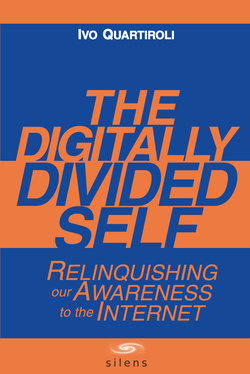Читать книгу The Digitally Divided Self: Relinquishing our Awareness to the Internet - Ivo Ph.D. Quartiroli - Страница 29
На сайте Литреса книга снята с продажи.
Inner Holes and Techno-Fills
ОглавлениеWith or without technology, the development of a human being involves both growth and loss. This process of evolution of the soul develops the various inner qualities at different rates during the specific developmental stages. The loss – or lack – of various essential qualities of our soul can occur quite early.
Internalizing our object relations is an essential stage for the development of our personality, but they have to be understood and relinquished in the advanced stages of self-understanding. We need to feed our psyche through relating with others from the time we are born, perhaps even earlier. Later, we internalize those object relations and unconsciously project them on other people and tools – from teddy bears to Facebook. When those relationships fail to properly feed our soul with the needed qualities – as usually happens – we are left feeling the emptiness of our inner holes, which we then try to compensate for.
According to Almaas (1987), the stages in the development of a newborn baby begin with a state of unity. At about three months, a “merged” dual-unity arises that is essential for the development of the relationship with the mother. This period supports the development later of the qualities of Strength, Value, Joy, and the Personal Essence. But these can be only partial, due to interference from and conflict with an imperfect holding environment. Traumatic encounters obstruct specific qualities of Essence, depending on the nature of the trauma and developmental timing. When a quality is ultimately blocked, a feeling of emptiness – like a hole deep within us – accompanies our future life.
It is important for a newborn to enjoy the best psychological and physical care. Yet even with the luck of having had the most attentive familial and social conditions, the partial or total disappearance of the original qualities of the soul cannot be avoided. The process of personality formation itself, from the appearance of duality to the shrinking or disappearance of essential qualities, is inevitable.
In developing self-awareness through a psycho-spiritual path, we can rediscover the soul’s essential qualities that were lost in the first years of life. We can even reach a state beyond duality, one quite different from the original indistinct, merged, non-dual state of the infant who lacked discrimination and awareness.
The absence of connection with the deepest aspects of our soul and the loss of the essential qualities leave a sense of emptiness – that we must be compensated for, somehow. Every human being, consciously or unconsciously, feels those empty spaces within them that need to become whole again – if not in a genuine manner, then with a substitute, like a pacifier for a baby. The mind itself will compensate through internalizing the object relations as well as through imagination.
The losses of parts of the soul are felt as amputations – which require prostheses to perceive wholeness again. The place of authentic essential qualities is taken by impostor aspects of the ego which simulate those qualities. For instance, the loss of essential Will – which gives the sense of a deep ground, like the support of the universe – might be compensated for by stubbornness and through pressing/stressing ourself. Strength can be replaced by arrogance; and Compassion by superficial sentimentality. This is the best the ego can do with its limited capacities.
Not knowing that every authentic quality can be found again in our depths, the search for compensation typically is directed to external tools. For historical and religious reasons, the need to extend our possibilities through technology originates from the need to recover parts of ourself that were lost along the path of life, a return to the wholeness of our original state.
In addition to extending our physical bodies – as with cars – we project our inner qualities on technology. For example, three basic aspects of the soul are Inner Peace, Intimacy and Personal Will. TV promises to satisfy our need for peace and relaxation through inducing a passive and receptive inner state. But at the same time it leaves us, as shown by several researchers, restless and frustrated once the viewing comes to an end. To appease this restlessness we seek out yet more TV.
Intimacy can be accessed through social networks and dating websites. When our connections expose the lack of deep contact, we feel even more isolated – and the solution is to find more connections through the Net.
The need for inner Will is projected on tireless machines which work incessantly for our good. This mechanization dominates awareness of our own Will, so we seek more automation and power through technologies.
Using the mind, we struggle to compensate for those qualities which were lost in a time even preceding the formation of the conceptual mind itself. As with a car in mud, the harder we try to get out, the deeper we become mired. Trying to gain anything through external tools can only start a vicious cycle, since the goal will never be reached that way.
In our dependence on technology to recover our completeness, we can become servomechanisms of technology. Lewis Mumford (1934) pointed out that since the advent of the clock, we have gone from timekeepers to time-savers to time-servers. And since the invention of the clock, technology has grown far more sophisticated and encompassing.
